- Home
- Mike Lupica
The Extra Yard
The Extra Yard Read online
THANKS
FOR DOWNLOADING THIS EBOOK!
We have SO many more books for kids in the in-beTWEEN age that we’d love to share with you! Sign up for our IN THE MIDDLE books newsletter and you’ll receive news about other great books, exclusive excerpts, games, author interviews, and more!
CLICK HERE TO SIGN UP
or visit us online to sign up at
eBookNews.SimonandSchuster.com/middle
For the great Esther Newberg
ONE
Teddy Madden felt better about himself than he ever had before. Even though he was scared out of his mind.
He was starting eighth grade next week, but he wasn’t scared about starting another year in school. He was actually excited about that.
He was scared about football.
In two days he had tryouts for the Walton Wildcats, a new football team for the best kids his age, even though he had never played a game of organized football before.
He kept telling himself he was in the best shape of his life. In the past he’d joked that he had no shape, other than maybe a blob. He had a good attitude about sports for the first time. That was thanks to his friend Jack Callahan.
It was Jack who’d nominated himself last spring to become Teddy’s personal trainer. Jack basically told Teddy he was going to get in shape or else.
Teddy hated the workouts at first. But slowly he came to like them, and then love them. Mostly he loved the way they made him feel good about himself. Before then, he just figured self-esteem was for somebody else’s self. Not anymore. Teddy felt good, and not just about being in this kind of shape. He and Jack weren’t just teammates. They were friends.
They were boys.
Teddy thought of himself as a whole new kid: Teddy Madden 2.0. So maybe it figured he would have new friends, too, like Jack and Gus Morales and Cassie Bennett. Cassie was the star of girls’ sports in Walton the way Jack was for boys’.
Once Teddy started to get himself into shape, a lot of things began to happen, both in sports and in his life. For one thing, he ended up the catcher on the Walton baseball team, the Rays, which had made it all the way to the United States final of the Little League World Series in Williamsport, Pennsylvania.
Everybody on the team would always think they would have won the final if Jack had been able to pitch. But the Rays needed him in the semifinal, where he’d pitched a one-hitter in beating a team from Toledo. In the final the Rays fell behind 7–1. They came all the way back to tie, before losing in the bottom of the last inning to a pretty great team from Las Vegas.
Because of the way they had come back, though, they left Williamsport feeling as if they’d won something. Teddy was pretty sure that in Walton, people who’d watched their games on ESPN would always remember the near no-hitter Jack had pitched, and that big comeback against Las Vegas.
“The more you play,” Jack said when they got home, “you find out there’s more than one way to keep score in sports.”
That baseball season had started with the old Teddy, the out-of-shape and overweight Teddy. He was a blob-shaped spectator. But he had ended up in Williamsport, hitting a two-run double to tie Vegas at 7–7. It was the kind of hit you always dreamed about hitting, in the big game, on national television. Teddy Madden had gotten that hit. Even if it wasn’t enough to win that game for his team, he’d still gotten that hit.
By then, nobody was calling him by his old nickname: Teddy Bear.
On the baseball field behind Walton Middle School, one that Jack and Teddy were now using to play football, Jack said to Teddy, “We’re going to need a new nickname for you.”
It was just the two of them on a Thursday morning, the end of the last week before school. They threw Teddy’s new football around on a field that was so close to his house it was almost like an extension of his backyard.
They took a quick break after going at it hard for an hour, sat on the grass, and drank Gatorade out of the bottles they’d brought. Teddy knew their rest period wouldn’t last long. It never did with Jack Callahan.
“The one nickname I had before was more than enough,” Teddy said. “You know how big my mom is on gluten-free food? My plan is to be nickname free.”
Jack acted as if he hadn’t even heard him. “How about Teddy the Tiger?”
“You make me sound like I should be telling you to eat your cereal,” Teddy said. “And really? A tiger on a team called the Wildcats?”
“Excellent point,” Jack said. He thought for a moment, frowning. “How about Terrible Ted?”
“Would I have to carry one of the Steelers’ Terrible Towels?”
“This might turn out to be harder than I thought.”
“You’re not hearing me,” Teddy said. “I don’t want a nickname. And by the way? You seem to be surviving without a nickname, except when Gus calls you Star.”
“Which I hate.”
“The way I hated Teddy Bear!” Teddy said. “It always made me feel like I was the class mascot, not just the class clown.”
“I never thought you were either one,” Jack said. “I always thought there was a warrior waiting to break out.”
“A warrior?” Teddy said. “Are we getting ready to play football games, or video games? What do you think this is, Call of Duty?”
“Little bit,” Jack said.
“Still don’t know why you thought of me that way,” Teddy said “A would-be warrior.”
“I’m very observant,” Jack said.
“So you can probably use those powers of observation to see how nervous I am about the day after tomorrow.”
“You’re going to make the team.”
“You say.”
“I know,” Jack said.
“What if I start dropping passes all over the place?”
“You don’t drop them when I throw them to you here, you’re not going to drop them at Holzman.”
Holzman Field was the field where the Wildcats would play their home games, in a brand-new elite league for their part of the country called All-American Football. The kids who didn’t make the Wildcats would play on Walton’s Pop Warner team.
“I wish I was as confident in me as you are,” Teddy said. “But even if I don’t make the Wildcats, at least I know I’ll get to play Pop Warner.”
Jack said, “You know that nickname you just said you hated? Let’s not turn back into that guy now.”
He casually reached over with his right fist. Teddy knuckle-bumped him.
“Okay?” Jack said.
“I’m still nervous.”
“There’s a good nervous in sports,” Jack said. “I feel it all the time.”
“You don’t show it.”
Jack laughed. “Clearly you’re not as observant as I am.”
“How do you tell the difference between nerves and choking?”
Jack shrugged. “No clue,” he said. “Choking’s not in my vocab. And it’s not gonna be in yours.”
• • •
As good as Jack was in sports, he was even better as a friend.
Teddy didn’t care that Gus and Jack had been friends longer, or that Jack and Cassie were as close as a boy and girl could be without being boyfriend and girlfriend, at least not yet. When it came to Jack, Teddy just knew the most important thing you could know:
He could count on Jack.
And Jack knew he could count on Teddy.
Maybe it was because they’d been through so much together in a year. Teddy had been there for Jack when he’d briefly quit the baseball team, back when Jack was still blaming himself for the death of his older brother, Brad, in a dirt-bike accident, even though it wasn’t Jack’s fault at all.
But even while that was going on, and as much pain as Jack was in, it was Jack who stepped up
one day at gym class and told the other guys to stop picking on Teddy because of his weight. Then he hadn’t just helped Teddy to get into really good shape, he’d also helped Teddy find the confidence to face down his fears. And there were a lot of them at the time: fear of sports, fear of making friends, even a fear of heights.
Jack was also the first person Teddy had ever opened up to about his fear of being different from most of the kids he knew because he’d grown up without his dad around. His parents had divorced when Teddy was barely four years old, and his father moved all the way across the country to Oregon. Teddy saw him once a year, if that.
It was why Teddy had always made jokes like some kind of shield. In the process he had also kept other kids from getting close to him. At least until Jack had come along. He hadn’t given Teddy much of a choice. They were going to be boys, Teddy just had to deal with it.
Now here they were, just the two of them, halftime in another one of their workouts. Sometimes Gus would join them. But he couldn’t today: he had a doctor’s appointment for his school physical. Jack and Teddy were planning to meet up with Gus and Cassie later and figure out how they wanted to spend one of their last days of summer vacation.
There was no real plan. They didn’t need one, and that was one of the best parts of summer. It was practically a rule that you had nowhere you really needed to be until the first day of school. Or the first day of football practice.
Provided you made the team, of course.
This year Teddy couldn’t separate the start of school and the start of football in his head. He’d been marking time from the end of baseball—and the parade down Main Street in Walton the mayor had organized for them when they’d gotten home from Williamsport—until football tryouts at Holzman.
Even with his great spring and summer in baseball, from the time he’d started working out with Jack, his dream was to be a football player.
In two days he would officially get his chance.
Football was why he had pushed himself to get into shape. Football was Teddy’s goal. Jack said you needed to set goals for yourself in sports. He was sure Teddy would be the starter for the Wildcats at tight end.
He told him that again now.
“How about I just make the team first?” Teddy said.
“You’re going to make the team, you’re going to start, you’re going to be one of my primary receivers.”
“Have you been out in the sun too long today?” Teddy said. “Are you starting to feel light-headed?”
Jack shrugged. “Make your little jokes,” he said. “My parents just say I’m highly motivated.”
“Or maybe just dehydrated?” Teddy said.
“You want to have that attitude?” Jack said, picking up the ball and jumping to his feet. “Go long, sucker.”
Teddy tossed his Gatorade bottle aside. “I can do that,” he said.
Running came easily to Teddy now, after all the laps he and Jack had been running on the track. Jack had even gotten Teddy doing his interval training: sprinting, then slowing down to a jog, then sprinting even harder than before.
When they’d finished the first time, Teddy had said to Jack, “I used to think intervals were just the time between snacks.”
But in the late morning, the sun already high in the sky, Teddy ran as hard as he could, from rightfield toward left. He knew it was impossible to outrun Jack Callahan’s right arm. So he just put his head down, trusting Jack would let him know when he should turn back for the ball.
“Now!” he heard Jack yell.
Teddy turned back and looked up at the same time, saw the ball in the air, another perfect spiral. He reached for it, secured it with his big hands—“mitts,” Jack called them—and then pulled the ball tight to his chest.
Teddy kept running with the ball until he reached the fence in the left-field corner. In that moment he just wanted to keep going, run through the fence or try to jump over it. The feeling he had, he wanted that feeling to last, he wanted to imagine the green grass out here stretching out in front of him forever.
You always heard the announcers on television talking about receivers “running in space.” That was what Teddy felt then. Like he was the one running in space.
Or just floating through it.
From the across the field Jack shouted, “Are you planning on coming back anytime soon?”
“If I come back,” Teddy shouted back, “I know what you’re going to say.”
“What?”
“Go long again.”
“Exactly!” Jack said.
When Teddy got back to him, he said to Jack, “You went a lot easier on me when you felt sorry for me.”
“No way,” Jack said. “You didn’t need me to do that, because you were too busy feeling sorry for yourself.”
“Excellent point.”
The truth was, and they both knew it, they were both feeling pretty sorry for themselves when they first became friends, even though they didn’t know that was what they were doing at the time. There was the day when Jack just got tired of the other guys picking on Teddy, how funny the other guys thought it was when Teddy ended up on the floor during a game of dodgeball. Jack went over and helped Teddy up, in more ways than one.
But around the same time, Teddy helped Jack get up too and stop blaming himself for his brother’s accident. Teddy finally helped convince Jack that Brad Callahan, as reckless as he was, with dirt bikes and everything else, was an accident waiting to happen. Jack didn’t need anybody to pick on him, because he was doing way too good a job beating himself up.
“I found out the hard way,” Jack liked to say now. “It’s not about getting knocked down, it’s how you get back up.”
He and Teddy had done that.
Together.
• • •
Jack threw Teddy another deep ball, telling him to angle toward the infield this time, like he was running a deep post pattern. On this one, Teddy had to slow down a little to catch the ball in stride.
“Arm getting a little tired there,” he said.
“We’ll see how tired I look the next time I knock you over with a short pass,” Jack said.
That was the thing about Jack. As cool a kid as he was, he was cocky, too. He just managed to do a good job hiding it from people. But it was always there.
“I take it back!” Teddy said, laughing. “Please don’t hurt me!”
Teddy knew the drill with Jack Callahan: you were never just throwing the ball around. There was a purpose to everything he did. To him, this was a real practice. So they ran some short slants, the ones Jack was sure would be in their playbook this season. Jack practiced taking a one-step drop after being snapped the ball by an imaginary center, straightening up, hitting Teddy in the gut with passes that sometimes knocked the wind out of him.
They alternated those with quick outs. Then Jack told Teddy to go deep again. When they decided to stop for good, they stretched out on their backs in the outfield grass, both out of breath.
They were silent for a while, feeling the sun on their faces, until Jack said, “How much taller are you than when you started seventh grade?”
“My mom says four inches. Maybe five.”
“You, my friend, are going to be a matchup nightmare. You’re built like a tight end, but you’re as fast as a wide receiver.”
“How about we find out if I can catch like this at the tryouts before you send me to the Hall of Fame in Canton?” Teddy said. “Did it ever occur to you that maybe I’m not ready for this? It’s not like I made the baseball team. I just turned out to be an emergency catcher after Scott Sutter got hurt.”
Jack propped his head up in his hand and looked at him. “Blah, blah, blah,” he said. “When the old Teddy starts talking, I can’t hear a word.”
Teddy nodded. “Old habits.”
“Forget about old habits, or the old Teddy. You can do this. We can do it together.”
“We’re a team now.”
“Just like baseball,”
Jack said. “I pitch, you catch.”
Jack said he’d wait while Teddy dropped the ball off at his house, and then they’d call Gus and Cassie and meet them at Cassie’s. Teddy ran the short distance to his house, the ball under his arm again. He smiled as he ran, knowing he should feel tired, but not feeling tired at all.
He just felt happy.
At least he did until he got to his back porch, looked up, and saw his father standing there.
“Hey, champ,” David Madden said.
TWO
The next afternoon Teddy and his three friends were at the pond near Cassie Bennett’s house. They lay on the dock, all of them in their bathing suits, having just gone for another swim.
Cassie Bennett always asked the most questions, about everything. Today was no different.
“This is really happening?” she said. “Your dad’s moving back here?”
“He has moved back.”
“And you didn’t know until yesterday?”
Teddy shook his head.
Cassie said, “And he didn’t tell your mom, either?”
“He said he wanted it to be a surprise,” Teddy said. He spread out his arms, put a fake smile on his face, and shouted “Surprise!” the way you did at a surprise party.
“Unbelievable,” she said.
“Gee, you think?”
“And you’re not happy about this?” Jack said.
“Do I sound happy?”
Jack let that one go.
They all sat there in silence for a moment, all of them on towels, staring up into sun and blue sky. Only it didn’t feel like much of a blue-sky day to Teddy.
“And what did he say to you, mostly?” Gus said.
“He said he wanted to make this a new beginning for us,” Teddy said. “I asked him when we’d ever had an old beginning.”
His father had moved to Oregon to take a job in sales for Nike. Now he had gotten a better offer from ESPN, which had a new office about a half hour away. Teddy had driven by it one time, when Jack’s parents had taken them to a water park down the road from what everybody called the new ESPN “campus.”

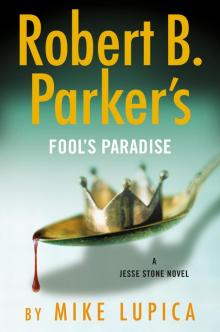 Fool's Paradise
Fool's Paradise Batting Order
Batting Order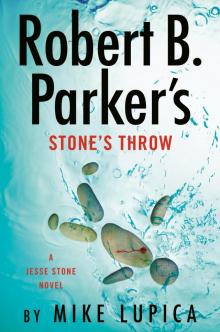 Stone's Throw
Stone's Throw The Lacrosse Mix-Up
The Lacrosse Mix-Up The Hockey Rink Hunt
The Hockey Rink Hunt Payback
Payback Triple Threat
Triple Threat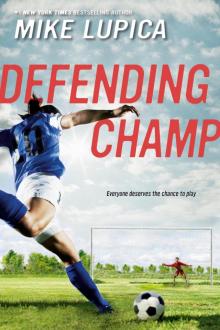 Defending Champ
Defending Champ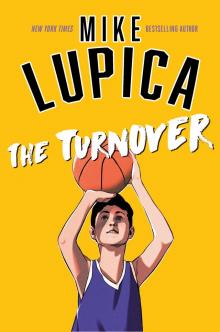 The Turnover
The Turnover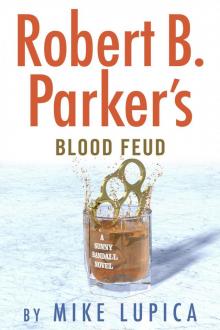 Robert B. Parker's Blood Feud
Robert B. Parker's Blood Feud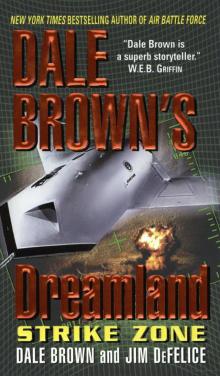 Strike Zone
Strike Zone Hero
Hero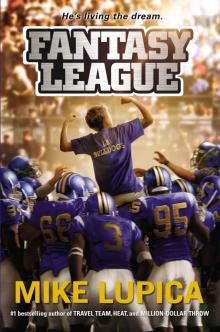 Fantasy League
Fantasy League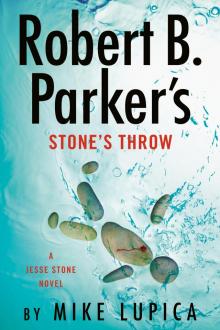 Robert B. Parker's Stone's Throw
Robert B. Parker's Stone's Throw The Big Field
The Big Field Jump
Jump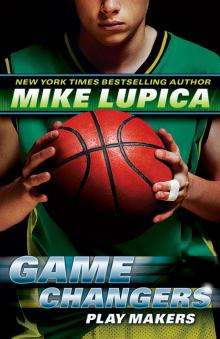 Play Makers
Play Makers The Underdogs
The Underdogs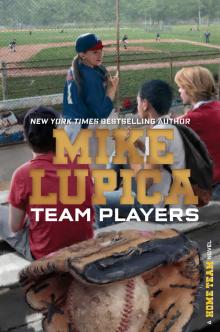 Team Players
Team Players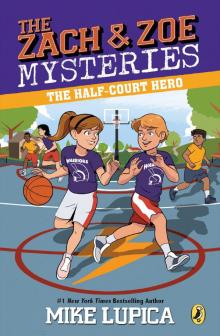 The Half-Court Hero
The Half-Court Hero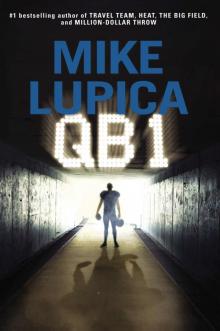 QB 1
QB 1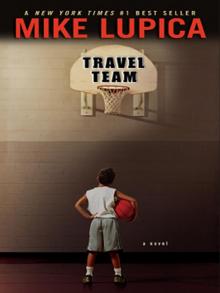 Travel Team
Travel Team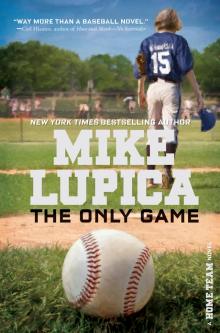 The Only Game
The Only Game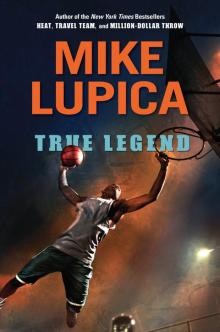 True Legend
True Legend The Batboy
The Batboy Hot Hand
Hot Hand Million-Dollar Throw
Million-Dollar Throw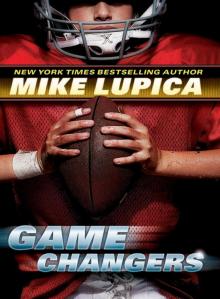 Game Changers
Game Changers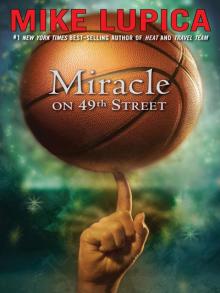 Miracle on 49th Street
Miracle on 49th Street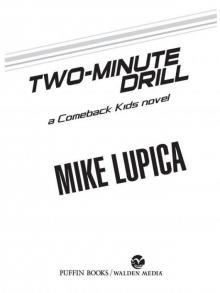 Two-Minute Drill
Two-Minute Drill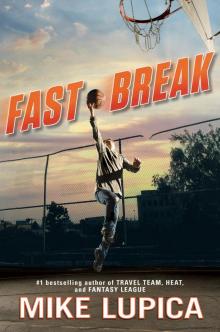 Fast Break
Fast Break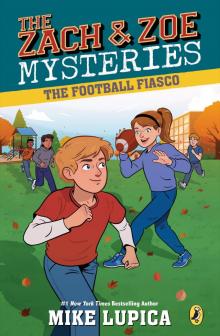 The Football Fiasco
The Football Fiasco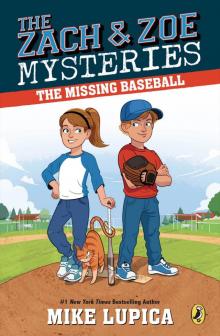 The Missing Baseball
The Missing Baseball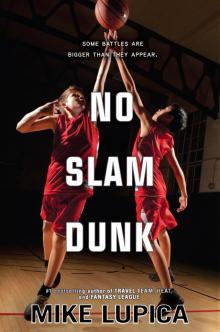 No Slam Dunk
No Slam Dunk Heavy Hitters
Heavy Hitters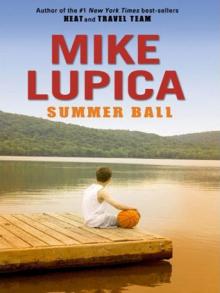 Summer Ball
Summer Ball The Extra Yard
The Extra Yard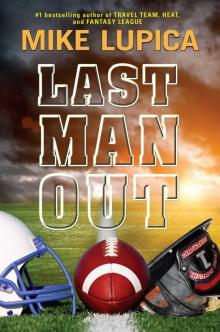 Last Man Out
Last Man Out